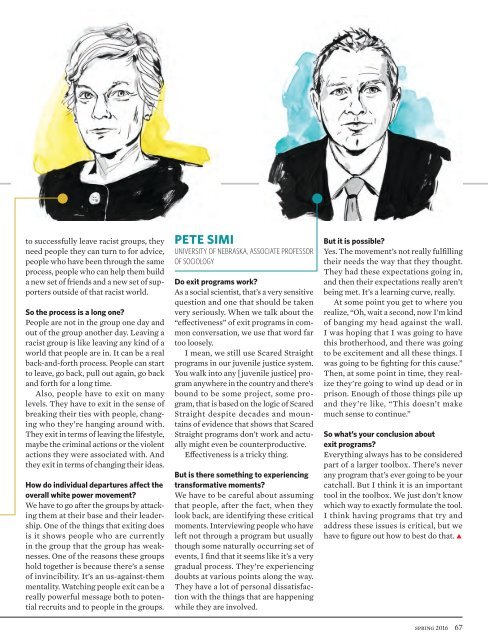You also want an ePaper? Increase the reach of your titles
YUMPU automatically turns print PDFs into web optimized ePapers that Google loves.
to successfully leave racist groups, they<br />
need people they can turn to for advice,<br />
people who have been through the same<br />
process, people who can help them build<br />
a new set of friends and a new set of supporters<br />
outside of that racist world.<br />
So the process is a long one?<br />
People are not in the group one day and<br />
out of the group another day. Leaving a<br />
racist group is like leaving any kind of a<br />
world that people are in. It can be a real<br />
back-and-forth process. People can start<br />
to leave, go back, pull out again, go back<br />
and forth for a long time.<br />
Also, people have to exit on many<br />
levels. They have to exit in the sense of<br />
breaking their ties with people, changing<br />
who they’re hanging around with.<br />
They exit in terms of leaving the lifestyle,<br />
maybe the criminal actions or the violent<br />
actions they were associated with. And<br />
they exit in terms of changing their ideas.<br />
How do individual departures affect the<br />
overall white power movement?<br />
We have to go after the groups by attacking<br />
them at their base and their leadership.<br />
One of the things that exiting does<br />
is it shows people who are currently<br />
in the group that the group has weaknesses.<br />
One of the reasons these groups<br />
hold together is because there’s a sense<br />
of invincibility. It’s an us-against-them<br />
mentality. Watching people exit can be a<br />
really powerful message both to potential<br />
recruits and to people in the groups.<br />
PETE SIMI<br />
UNIVERSITY OF NEBRASKA, ASSOCIATE PROFESSOR<br />
OF SOCIOLOGY<br />
Do exit programs work?<br />
As a social scientist, that’s a very sensitive<br />
question and one that should be taken<br />
very seriously. When we talk about the<br />
“effectiveness” of exit programs in common<br />
conversation, we use that word far<br />
too loosely.<br />
I mean, we still use Scared Straight<br />
programs in our juvenile justice system.<br />
You walk into any [juvenile justice] program<br />
anywhere in the country and there’s<br />
bound to be some project, some program,<br />
that is based on the logic of Scared<br />
Straight despite decades and mountains<br />
of evidence that shows that Scared<br />
Straight programs don’t work and actually<br />
might even be counterproductive.<br />
Effectiveness is a tricky thing.<br />
But is there something to experiencing<br />
transformative moments?<br />
We have to be careful about assuming<br />
that people, after the fact, when they<br />
look back, are identifying these critical<br />
moments. Interviewing people who have<br />
left not through a program but usually<br />
though some naturally occurring set of<br />
events, I find that it seems like it’s a very<br />
gradual process. They’re experiencing<br />
doubts at various points along the way.<br />
They have a lot of personal dissatisfaction<br />
with the things that are happening<br />
while they are involved.<br />
But it is possible?<br />
Yes. The movement’s not really fulfilling<br />
their needs the way that they thought.<br />
They had these expectations going in,<br />
and then their expectations really aren’t<br />
being met. It’s a learning curve, really.<br />
At some point you get to where you<br />
realize, “Oh, wait a second, now I’m kind<br />
of banging my head against the wall.<br />
I was hoping that I was going to have<br />
this brotherhood, and there was going<br />
to be excitement and all these things. I<br />
was going to be fighting for this cause.”<br />
Then, at some point in time, they realize<br />
they’re going to wind up dead or in<br />
prison. Enough of those things pile up<br />
and they’re like, “This doesn’t make<br />
much sense to continue.”<br />
So what’s your conclusion about<br />
exit programs?<br />
Everything always has to be considered<br />
part of a larger toolbox. There’s never<br />
any program that’s ever going to be your<br />
catchall. But I think it is an important<br />
tool in the toolbox. We just don’t know<br />
which way to exactly formulate the tool.<br />
I think having programs that try and<br />
address these issues is critical, but we<br />
have to figure out how to best do that. ▲<br />
spring 2016 67


